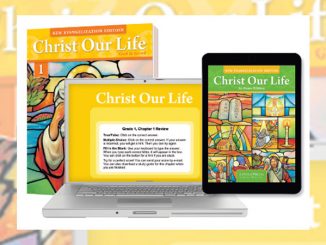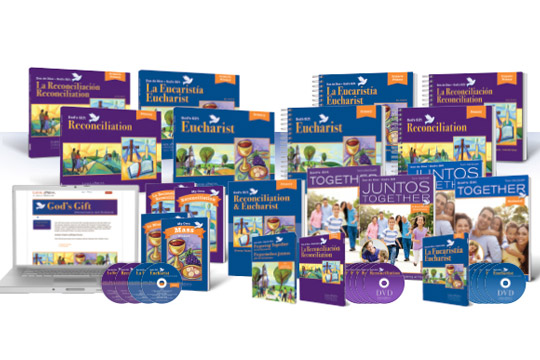 In the great movie, A League of Their Own, Tom Hanks’s character, Jimmy Dugan, made famous the phrase “There’s no crying in baseball!” I have to admit that I’m coming very close to exclaiming, in that same incredulous voice, “There’s no catch-up in catechesis!”
In the great movie, A League of Their Own, Tom Hanks’s character, Jimmy Dugan, made famous the phrase “There’s no crying in baseball!” I have to admit that I’m coming very close to exclaiming, in that same incredulous voice, “There’s no catch-up in catechesis!”
Now, you might attribute this to the fact that I was born and raised in Chicago, where there’s no ketchup on hot dogs, and I just don’t like the phrase “catch up,” but I assure you it goes deeper than that. We have become so accustomed to children going through faith formation “in sequence,” moving from one grade level to another, that we coined the phrase “catch-up catechesis” for children who come to us “out of sequence.” We did so, of course, with the best intentions. However, now we face the reality that “out of sequence” is becoming the norm! Children are being brought to us for faith formation and sacramental preparation at various ages and grade levels and with little or no previous faith formation. Until now, our immediate reaction has been to offer them something so that they “catch up” with their peers. What happens, however, when there are more “out of sequence” children than “in sequence” children? To whom are they catching up?
I liken this reality to the experience that occurred in seminary training over the past 50 years. I began my career teaching in a high school seminary here in Chicago back in the 1980s. Until that time, the typical path to ordination was to attend the high school seminary, followed by the college seminary, and culminating in the major seminary or theologate. When a candidate showed up outside of that sequence, he was referred to as a “special.” Eventually, there were more “specials” applying to major seminaries than there were high school or college seminarians. As a result, the structures have been altered, and high school and college seminaries are now, for the most part, relics of the past. This change in structures recognizes the fact that the Holy Spirit cannot be relegated to a sequence.
We are approaching a time (if not already present) when the same shift in structures will need to take place in children’s faith formation. We can no longer expect that children will begin their faith formation with preschool or Kindergarten and proceed sequentially through eight grades culminating in Confirmation. The sooner we embrace that fact, the better off we will be.
In the meantime, when parents bring us children who are “out of sequence,” we need to resist the temptation to put them in a “remedial” setting and give them “catch up” catechesis. The Holy Spirit does not work that way. Rather than “catch up” catechesis, we need to think kerygma! This simply means that we begin their faith formation journey by introducing children to Jesus and inviting them to encounter him and his Good News of salvation. As my friend Jayne Ragasa-Mondoy explains:
A feeling of angst may lead us to begin our conversations with a list of what families are to do. Instead, we should lead with an attitude of Gospel-inspired joy: “‘But we had to celebrate and rejoice, because this brother of yours was dead and has come to life; he was lost and has been found’” (Luke 15:32).
This is a catechumenal approach to faith formation as opposed to an academic (school model) approach. When people enter the adult catechumenate, we (hopefully!) don’t put them in a remedial class to “catch up” with their peers. Rather, we invite them to encounter Jesus Christ and to enter into a deeper relationship with him as we gradually lead them deeper into the Paschal Mystery and a life of discipleship.
As families bring “out of sequence” children to us to begin faith formation and sacramental preparation, the path that we lay out for them should more and more resemble entrance into the catechumenate, flavored by a proclamation of the kerygma, the central message of the Gospel: God invites you to encounter his only Son, Jesus Christ, whom he sent to rescue us from the brokenness of sin, restore us to fullness of life, and reassure us of his steadfast presence!





Thank you for this article I don’t like the catch-up phrase I have always used the catechumenate model to engage the children and families that have been away from the church. Forming a relation with God and the parish has been the best way to catechize and to a life of discipleship. Having student intergraded with there peers for ongoing faith formation. Establishing we don’t just show up and sign up for sacraments, evangelize students and parents to a relationship with God. It’s no easy task, yet it brings great joy when we see them return for faith formation and volunteering in parish life. At the end of it all, is that not what we should strive for to welcome them back HOME. Amen
Thanks for sharing your thoughts, Julie. I’d love to hear more about how you accomplish this in your parish. Let me know if you’d be open to a Zoom meeting so I can pick your brain. Thanks. -joe
I’d love a part 2, 3, 4, etc. on this! This has been the subject of many DRE meetings and we are all looking for good and creative ways to make this happen.
Thanks, Michele. I’d love to talk more about this so I can pick your brain and explore ways to make this happen. Perhaps I can set up a Zoom with you? Let me know. -joe
The truth is that each child is “special” in God’s eyes – and he or she arrives exactly when the Holy Spirit sends their family to us. Conversion takes place one person at a time, so it’s more important that each child comes to know Jesus, accepts the salvation he offers. We should want to plant in them the seeds of lifelong faith in God, rather than merely expecting them to learn about religious beliefs and practices as if they were facts in a school subject.
Thanks for your excellent comments, Joyce! Couldn’t agree more!
Thos of us ministering to families in the Hispanic Community have been facing this for years…
Our biggest need is text which do not contain grade level indications (or ages) on the cover, use a variety of photos (not depicting one age group of students i n the text), and language that engages but does not make assumptions that they have prior knowledge or the foundational vocabulary to be “beginners”. presently I have 4 beginners classes; Beginner 1 (1st and 2nd graders), Beginner 2-( 2,3,and 4th graders bilingual),Beginner 3 (4-6th graders), and Beginner 4 (7-8 grade). You can imagine that we are using a variety of texts to meet these needs. Next year they will all be preparing for First Sacraments……
Thanks for sharing about your “Beginners” groupings, Theresa! And yes, the issues you point out are very critical!
I agree with your reflection that this ‘out of sequence’ is becoming more the norm. We have seen a surge of families that dropped out of faith formation during the pandemic coming back. Children who have little to no experience of faith are being brought to us for catechesis. We need a hard change in mindset that it is the kerygma and meeting Jesus they need, not checking the blocks of just ‘make their sacraments’.
Well-said, Cindy. We too often play into this unhealthy cycle by trying to “squeeze” children into the “system” or “assembly line” that too often passes for faith formation.